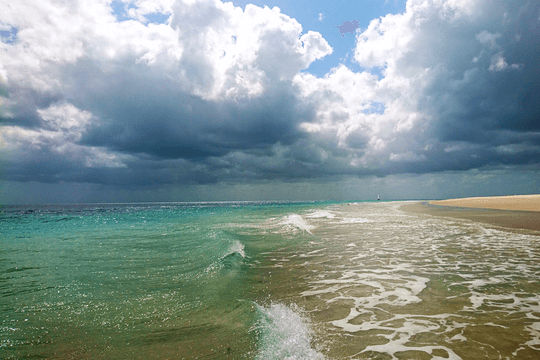
The oceans have hit their hottest ever recorded temperature as they soak up warmth from climate change, with dire implications for our planet’s health.
The Earth’s oceans are in a state of simmering turmoil, with marine heat waves affecting approximately 48% of the ocean in August, as reported by the National Oceanic and Atmospheric Administration (NOAA).
This alarming development adds to the mounting concerns about the oceans, which are currently experiencing the hottest year on record since data collection began in 1991. The repercussions of this rising oceanic temperature are felt globally, from the UK, where coastal waters are an astonishing 9 degrees Fahrenheit (5 degrees Celsius) warmer than usual, to Florida, where the Atlantic Ocean has heated up to nearly 90 degrees Fahrenheit (around 35 degrees Celsius).
“The most staggering thing over my career of 30 years as a researcher, is that the things I thought were coming in 50 or 100 years, they’re here now,” says Alistair Hobday, a biological oceanographer and a research scientist at the Commonwealth Scientific and Industrial Research Organisation (CSIRO), Australia’s national science agency. “Heat waves are one of those. And I think of heat waves as if they’re an alarm bell. Surely people listen to an alarm.”
Hobday has dedicated years to analysing data to comprehend the impact of climate change on oceans, particularly in terms of rising temperatures. His research underscores the threat posed by marine heat waves to global biodiversity, which, in turn, endangers various sectors, including fisheries, food security, and tourism.
A study co-authored by Hobday in 2018, published in Nature Communications, revealed a staggering 54% increase in marine heat wave days between 1925 and 2016, attributable to climate change.
Recent initiatives led by CSIRO and other research groups aim to develop predictive methods for specific marine heat waves, particularly those resulting from oceanic processes rather than atmospheric changes.
“Where communities are prepared, impacts can be mitigated, at least partially,” Hobday wrote in the journal Nature this week. “This depends on knowing which regions are most likely to be affected.”
The gravity of this threat has prompted Hobday to advocate for naming marine heat waves, similar to the naming conventions used for hurricanes. Notably, Spain’s Seville is among the few places with established procedures for naming heat waves on land, highlighting the increasing recognition of the need to characterise and address these oceanic phenomena as significant events that demand attention and response.
People “don’t have a good sense of location in the ocean,” Hobday says. “Giving them a name also improves ocean literacy, and I think it helps build a connection to an event. Giving events a name helps them translate into the human experience.”
——————————————————————————
At Natural World Fund, we are passionate about stopping the decline in our wildlife.
The decline in our wildlife is shocking and frightening. Without much more support, many of the animals we know and love will continue in their decline towards extinction.
When you help to restore a patch of degraded land through rewilding to forests, meadows, or wetlands, you have a massive impact on the biodiversity at a local level. You give animals a home and food that they otherwise would not have had, and it has a positive snowball effect on the food chain.
We are convinced that this is much better for the UK than growing lots of fast-growing coniferous trees, solely to remove carbon, that don’t actually help our animals to thrive.
This is why we stand for restoring nature in the UK through responsible rewilding. For us, it is the right thing to do. Let’s do what’s right for nature!
Donate today at https://naturalworldfund.com/ and join in the solution!

